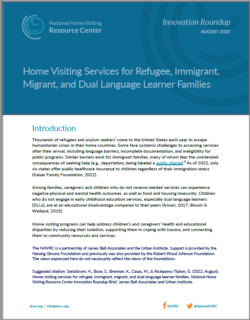
 Thousands of refugees and asylum seekers* come to the United States each year to escape humanitarian crises in their home countries. Some face hurdles to accessing services, including language barriers, incomplete documentation, and ineligibility for public programs. Immigrant families often face similar barriers while also fearing deportation or other unintended consequences if they seek help. Home visiting services can support refugee and immigrant families in engaging with others, coping with trauma, and accessing community resources and services. Access to services, in turn, may help offset concerns such as food and housing insecurity and negative health and educational outcomes.
Thousands of refugees and asylum seekers* come to the United States each year to escape humanitarian crises in their home countries. Some face hurdles to accessing services, including language barriers, incomplete documentation, and ineligibility for public programs. Immigrant families often face similar barriers while also fearing deportation or other unintended consequences if they seek help. Home visiting services can support refugee and immigrant families in engaging with others, coping with trauma, and accessing community resources and services. Access to services, in turn, may help offset concerns such as food and housing insecurity and negative health and educational outcomes.
This Innovation Roundup Brief spotlights five home visiting programs using innovative, strengths-based practices to reach and serve refugee, immigrant, migrant, and dual language learner families:
- Welcome Baby
- North Range Behavioral Health Family Connects Home Instruction for Parents of Preschool Youngsters
- ParentChild+ at Jericho Road Community Health Center
- Baby TALK at RefugeeOne Wellness Program
- Baby TALK at Community Consolidated School District 146 Bridges Birth to Three Program
*For this brief, we define a refugee as a person who moves outside of their country of origin due to feared persecution, conflict, generalized violence, or other circumstances that have disturbed public order and who requires international protection. We define immigrant as a person living in a new country other than their birth country and intends to remain there permanently. See the full brief for citations and additional definitions.
Suggested citation: Sandstrom, H., Bose, S., Brennan, K., Casas, M., & Atukpawu-Tipton, G. (2022, August). Home visiting services for refugee, immigrant, migrant, and dual language learner families. National Home Visiting Resource Center Innovation Roundup Brief. James Bell Associates and Urban Institute.
Acknowledgments: Thank you to Sharlene Gozalians, Vynette Moore, Juanita Puga, Aimee Hilado, Rae Reed, Tiffany Hall, Melissa Christian, Ida Htoo, and Manndy Say for sharing information about their home visiting programs. Thank you to Allison Meisch, Joelle Ruben, and Jill Filene for shaping and editing the brief.